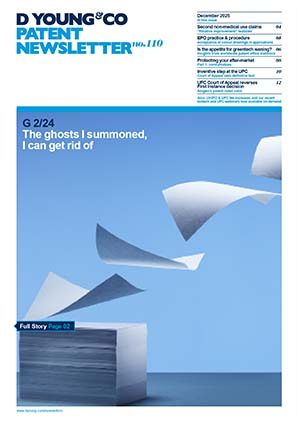Supplementary protection certificates: can Windsor resolve a knotty problem?
The agreement in principle of the Windsor Framework between the UK and EU regarding Northern Ireland, and its approval by the UK Parliament, brings to an end one of the most contentious parts of the Brexit saga.
Though the Windsor Framework contains no direct provisions regarding IP rights, its provisions regarding the regulation of medicines could simplify how Supplementary Protection Certificates (SPCs) for medicines are handled in the UK. This is because only one marketing authorisation (MA) from the UK medicines regulator may be required to support a UK-wide SPC in future, rather than both this MA and the EU MA as is currently the case for most SPCs. However, it still leaves some questions on SPCs unanswered.
The Northern Ireland Protocol
The UK has four constituent parts: England, Scotland and Wales (together Great Britain) and Northern Ireland. Under the 1998 Belfast (Good Friday) peace agreement, Northern Ireland must have an open border with the Republic of Ireland, which remains part of the EU.
The Northern Ireland Protocol, which was part of the original withdrawal agreement in 2019, attempted to square this with both the EU’s requirement for an external border and customs checks and the UK Government’s desire to remain outside the EU single market and customs union after Brexit.
Under the original protocol, EU law on goods, including medicines and plant protection products, continued to apply to Northern Ireland following Brexit. The effect of this was that regulation of medicines in the UK, and the granting of MAs to allow medicines to be placed on the market, was split. The majority of national MAs granted by the UK’s Medicines and Healthcare products Regulatory Agency (MHRA) covered only Great Britain, only some applying to the whole of the UK. In contrast, EU-wide MAs granted by the European Medicines Agency (EMA) continued to have effect in Northern Ireland, but no longer had any effect in Great Britain.
Existing SPC legislation in the EU & UK
SPCs extend the term of patents for medicines (both human and veterinary) and plant protection products (pesticides) which require the grant of an MA before they can be marketed. The aim of SPCs is to compensate the patent holder for the patent time lost due to the need to conduct efficacy and safety testing to obtain an MA – typically the process takes 10-14 years.
Under the EU SPC Regulation, the expiry date of an SPC was 15 years from the first MA date anywhere in the EEA, or five years from the expiry date of the basic patent. A further six months’ extension is available for medicines where paediatric studies are carried out in accordance with an agreed paediatric investigation plan.
The UK largely retained the existing EU legislation on SPCs following Brexit. However, as a consequence of the Northern Ireland Protocol, the filing of UK SPCs is also currently split. It is currently necessary to apply for a UK SPC based on whichever regulator (the MHRA or the EMA) grants an MA first – within six months of this first grant (or six months of the grant of the basic patent, if later). However, at that point the SPC would only cover either Great Britain or Northern Ireland respectively. Once the other MA grants, it is then necessary to apply to the UKIPO again to extend the SPC to the rest of the UK. If the second MA is not granted by the time the basic patent expires, the SPC can never cover that part of the UK. The term of the SPC was also amended slightly, the calculation being made from the date of the first MA in the UK or EEA, whichever was the earlier.
SPCs and the Windsor framework
There will be no immediate change to the existing provisions, as it will take time for the Windsor Framework to be implemented into UK and EU legislation. However, once this has been done, MHRA MAs will then once again cover the whole of the UK, and the EMA will no longer have any role in authorising human medicines for Northern Ireland.
The draft EU Regulation for implementing the framework appears to indicate that the EU envisages it to work in this way.
The draft EU Regulation amending the current EU human medicines law indicates it is intended to come into force on 01 January 2025, but if the UK provides the EU with the necessary written guarantees which the legislation requires, it may come into force sooner.
Veterinary and human medicines
The draft regulation does not propose to amend existing EU law on veterinary medicines, so these may remain regulated by the EMA in Northern Ireland according to the current split system.
When the necessary changes have been made to the UK legislation regarding SPCs for human medicines, it could mean that the double SPC filing requirement may fall away and a single SPC filing, based on the MHRA MA, will have effect across the whole UK when granted. However, if EU law on veterinary medicines continues to have effect in Northern Ireland, as the draft EU Regulation currently appears to envisage, the two separate MAs may remain and the dual SPC filing system may remain in force for veterinary medicines.
Plant protection product SPCs
There will be no change to plant protection product SPCs, as these products are currently authorised only at a national level: there is no agency equivalent to the EMA which issues EU-wide MAs. A UK MA for a plant protection product, and any SPC based on it, already covers the whole of the UK, and will continue to do so.
SPC filing deadlines and expiry dates
The uncertainties in the framework and its implementation continue to raise questions regarding both the deadline for filing UK SPCs and the expiry date of SPCs. If the implementing legislation leaves any remaining role for the EMA in medicines in Northern Ireland (which currently appears the case, at least for veterinary medicines), then this raises the question of which MA is used to calculate both the six-month SPC filing deadline in the UK and the expiry date of the UK SPC.
The Court of Justice of the European Union treated Swiss MA dates as being the first MA date in the European Economic Area (EEA) (as they applied to Liechtenstein, an EEA member, although this was overcome by them being placed on a “negative list”). Similarly, if the MHRA MA date is somehow considered the first MA date in the EEA, because it still applies to Northern Ireland, then this could also have an effect on SPC expiry dates across the EEA.
Comment
Overall, while the Windsor Framework has the potential to remove trade barriers in medicines between Great Britain and Northern Ireland, depending on how it is implemented it has the potential to make SPCs in the UK either simpler or yet more complex. We will monitor its implementation and keep you updated.

